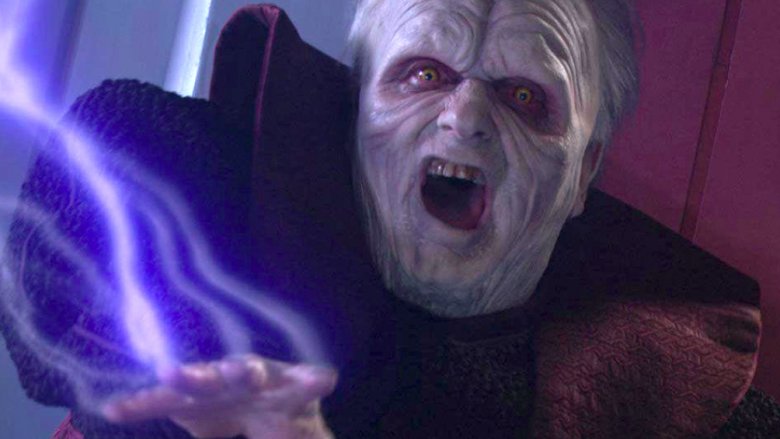The Outrage Over Palpatine In Rise Of Skywalker
What is old is new again.
Ever since we heard that distinct laughter at the end of the trailer for Star Wars Episode IX: The Rise of Skywalker, we've been stunned by the fact that Emperor Palpatine, AKA Darth Sidious, is returning for the conclusion of the Skywalker Saga. More than a few fans, however, are not so much stunned as they are peeved.
These fans would like to know: why on Earth would director J.J. Abrams and co-writer Chris Terrio bring back a Big Bad who has supposedly been dead for over three decades? Could they simply not think of any other way to raise the stakes of the sequel movies' story? What kind of narrative gymnastics will Rise of Skywalker have to engage in to make this plot development make sense? How, exactly, can this even happen?
In case you need a brief refresher, Palpatine was a central figure in both the original and prequel trilogies. The former Senator in the Galactic Republic was a Sith Lord in disguise; he was instrumental in the rise of the Empire, he successfully turned Anakin Skywalker to the Dark Side of the Force, and he very nearly achieved complete dominance over the galaxy.
Ironically, it was his rage at his inability to turn Anakin's son Luke to the Dark Side which proved to be his undoing. At the conclusion of Star Wars Episode VI: Return of the Jedi, Palpatine attempted to manipulate Luke into killing his father (who, of course, had taken on the Sith moniker of Darth Vader upon becoming Palpatine's apprentice). But the plan failed, and when Luke refused to fight, Palpatine attempted to simply kill the young Jedi, assaulting him with vicious blasts of Force lightning as Vader looked on.
In that moment, however, Vader turned away from the Dark Side and toward redemption. He seized the Emperor and tossed him down a seemingly bottomless shaft, apparently killing him and bringing balance to the Force (and mortally wounding himself in the process).
The sequel films pick up 30 years after these events, as the remnants of the Empire are reforming into the nefarious First Order under the guidance of the Supreme Leader Snoke and his protege, Kylo Ren (who is revealed to be the former Ben Skywalker, son of Han Solo and General Leia, and a former apprentice of Luke who turned to the Dark Side). Star Wars Episode VII: The Force Awakens clearly seemed to set up Snoke as the Big Bad of the sequel trilogy, but a funny thing happened: midway through Star Wars Episode VIII: The Last Jedi, Snoke was killed by Ren, who apparently stepped into the Big Bad role and left the trilogy with no behind-the-scenes puppet master.
Why is J.J. Abrams bringing Palpatine back for The Rise of Skywalker?
Snoke's death was puzzling enough for many fans, and was a major factor in the backlash that The Last Jedi endured from the Star Wars faithful. The tease of Palpatine's return to the franchise stoked the ire of these fans yet further, as the move is easy to interpret as an attempt by Abrams and company to cash in on the nostalgia for the original series. After all, Palpatine has not been featured in any way, shape, or form in the sequel films up to this point, and resurrecting him could be seen as lazy writing — especially considering that, again, he's supposed to be dead.
His return raises so many questions: what does it mean in terms of Darth Vader/Anakin Skywalker's heroic sacrifice? Are we supposed to now buy that Palpatine has been pulling strings for all of the intervening years between the original and sequel trilogies, and that improbably, nobody has caught on? Did he actually die and return somehow, or did he actually survive getting the heave-ho down a bottomless shaft?
There appear to be very few possible answers to any of these questions that will make a lick of sense, and the degree to which one is willing to go along for the ride with this plot wrinkle is going to depend largely upon how much one trusts Abrams. In a recent interview with Empire magazine, the director made it known that he's aware that some fans are confused, and he attempted to reassure said fans that he knows what he's doing.
"Some people feel like we shouldn't revisit the idea of Palpatine, and I completely understand that," Abrams said. "But if you're looking at these nine films as one story, I don't know many books where the last few chapters have nothing to do with those that have come before. If you look at the first eight films, all the set-ups of what we're doing in [Rise of Skywalker] are there in plain view." (via Slashfilm)
Obviously, it'll be tough to judge whether this is indeed the case before we've seen the conclusion of the story. We do know, however, that Palpatine's appearance will be no mere cameo; he's going to be instrumental to the events of Episode IX, and if a recent leak detailing his involvement in the narrative turns out to be accurate, his return could actually end up making a great deal more sense than it might appear on the surface.
We're down to reserve judgment on the Emperor's big comeback; a significant subset of fans might have found The Force Awakens to be derivative and The Last Jedi to have simply not been very good, but we are not among them. We're of the opinion that both films are Star Wars through and through, and we have faith that Abrams won't drop the ball in wrapping up one of the most epic sagas ever put to film. As long as Kylo doesn't rip off a mask to reveal that he's actually been Palpatine the whole time, we're pretty everything will be fine.
Star Wars Episode IX: The Rise of Skywalker hits the big screen on December 20.

